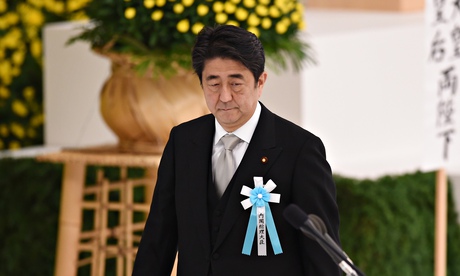The Japanese prime minister, Shinzo Abe, has sent a ritual offering to a Tokyo shrine to war dead, triggering angry criticism from China andSouth Korea where bitter memories linger of the country's actions before and during the war.
Abe decided not to visit the shrine in person as he seeks a Sino-Japanese summit but his offering to the Yasukuni shrine on the 69th anniversary of Japan's defeat in the second world war still angered South Korea and China.
Abe visited the shrine in December, sharply chilling ties with China and South Korea. By sending an offering on Friday, he appeared to be trying not to worsen tensions with both nations while upholding a conservative ideology that takes a less apologetic tone towards Japan's wartime past.
Koichi Hagiuda, an Abe aide and lawmaker, presented the ritual offering, which was made in Abe's name as leader of the ruling Liberal Democratic party.
"He wants to express his respect and to pay homage to the people who sacrificed their lives for the nation, while praying for a lasting peace," Hagiuda told reporters.
China criticised Abe's offering as well as the visits by the other Japanese cabinet members, saying it "resolutely opposes" the commemoration.
"The Yasukuni shrine is a symbol and spiritual tool of Japanese militarism," a Chinese foreign ministry spokeswoman, Hua Chunying, said in a statement.
"Only when Japan earnestly faces up to and deeply reflects on its history of aggression and completely makes a clean break from militarism, can it be possible for Sino-Japanese relations to achieve a healthy and stable development."
Tokyo had hoped that by staying away, Abe would send a signal to China of his desire to ease tensions and help pave the way for a summit with Chinese leader Xi Jinping. Recent tentative moves to meet have yet to bear fruit.
But China's Xinhua news agency said in a commentary that Abe's show of "compromise and sincerity" was not acceptable. "One who forgets and denies history does not deserve a future," it added. "It has become a matter of urgency for the current Japanese leaders to truly reflect upon the lessons of history so as to avert a risky future."
Ties between the two nations are strained over a number of issues, including a territorial row over a set of remote islands and China's declaration late last year of an air defence identification zone (ADIZ) in the East China Sea.
Beijing and Seoul have also criticised Abe's government for backing away from its postwar pacifism, by easing weapons export restrictions and ending a ban that has prevented the military fighting abroad.




